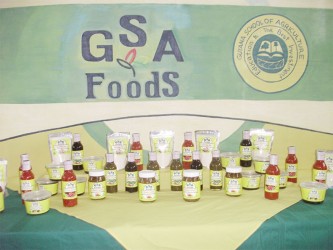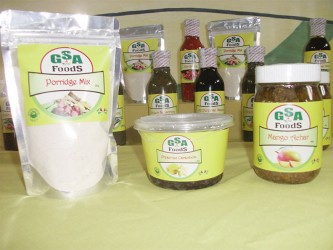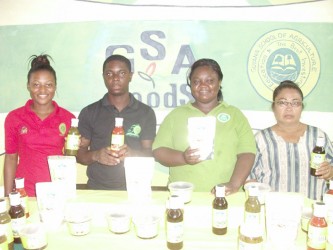By Desilon Daniels
With the right support, the Guyana School of Agriculture (GSA) may soon find its line of agro-processed products on supermarket shelves near you.
The products, marketed under the brand “GSA Foods,” were showcased at the recently-concluded GuyExpo 2014 and gave Guyanese a glimpse of just what can be locally produced.
In an interview with Stabroek News, Stacia Nelson-McDonald, Research Technician with the GSA, explained that the institute had taken part in this year’s expo in collaboration with the Ministry of Agriculture and the reception from the public had been good.
A lot of persons, she said, were surprised by the range of items available. “A lot of persons don’t know that GSA produces such things. Maybe they know that GSA exists and we have agricultural facilities, but they don’t know that we produce all of these products,” Nelson-McDonald said. She continued, “They’re also surprised at the packaging and the labelling; they think it looks professional.”
According to Nelson-McDonald, the products were big hits, particularly the porridge mix, which is a combination of plantains, cassavas, and sweet potatoes. “It’s very nutritious; it’s high in iron and protein and it’s very good for everyone. Persons here at work even buy it for their babies,” Nelson-McDonald said.
She went on to say that GSA partnered with NAMILCO (National Milling Company of Guyana Inc.) to produce the porridge mix coupled with NAMILCO’s Wheat Up product, samples of which were available to patrons at GuyExpo.
This new mix, Nelson-McDonald said, was very well received. Some persons, she added, even purchased on the spot, while others approached with offers of buying the item wholesale to resell.

Though the porridge mix was the most popular product available from the GSA, it was certainly not the only one. According to Nelson-McDonald, GSA displayed 10 products in total at GuyExpo, which included preserved carambola (five-finger), green seasoning, mango achar, hot sauce, and mixed fruits.
Other products made by GSA which did not make it to GuyExpo are chicken-ham, salted beef, pickled pork and bacon. All of these items, Nelson-McDonald said, are produced on GSA’s on-site farm.
All of the products were also produced by GSA’s students with additional support by teachers and staff. The labelling and packaging were also done by the institute.
However, Nelson-McDonald noted that the items are not available throughout the country.
“Most people are interested in, for example, the porridge mix but they say that they’re not seeing it on the market because it’s a new product,” she pointed out before adding, “GSA’s facility is mainly for teaching…but now we’re venturing off into marketing the products we produce. So, our products are only at the Guyana Shop on Robb Street currently.”
Nelson-McDonald stated that GSA is working on getting its products available nationwide and will soon enter into talks with supermarkets and shops.
Meanwhile, interest from the public about GSA has picked up, she revealed. She stated that the institute has been receiving more calls following GuyExpo’s conclusion. “Persons would normally come in from Chateau Margot and Plaisance to purchase the porridge mix. Persons are also asking to buy the porridge mix wholesale and to retail, now that they would’ve become aware of it,” she said.
Nelson-McDonald further noted the benefits agro-processing can have, not just for the economy but for citizens as well.
“It’s good for Guyanese as a whole and it would help the economy to grow. These are local products and we support local. The money will stay right here in Guyana,” Nelson-McDonald said. She continued, “The products are also much healthier because they have fewer preservatives than the ones overseas and our products come from the farm where we use less fertilizer. We don’t use fully-organic but it’s certainly not the amount that most farmers use.”
More support needed

Despite the huge impact agro-processing can play on the economy and livelihood of Guyana, much more support is still needed if the agro-processing industry in Guyana is to make substantial strides, Nelson-McDonald said.
“It is not making strides as yet; it’s not at its peak. We need much more support,” she opined. “We need support from the government because a lot of persons would normally come in here, because we also sell containers, and they are crying out about the cost for the bottles. Most of these containers come in and they’re not duty-free; agro-processors need to have duty-free concessions for the products,” she said. She continued, “That’s the most expensive thing; the containers. To produce the products is cheap but the containers are the challenge.”
Nelson-McDonald further explained that GSA currently uses plastic containers for its items but the facility is trying to move away from the material because some ingredients in the products might degrade the plastic.
She went on to say that GSA has to sell its products back to make a profit while businesses also need to make a profit. Eventually, when the product reaches the customer, it’s just too pricey, simply because of the price of its container, she said.
“In such a way you’re stagnated; we sell the porridge mix for $400 but resellers will sell it at $500 because they have a marked-up price. The products are moving slow – slower than we expect it to go – and of course we’re looking for a fast turnover. So the products are remaining long on the shelf, and that’s a challenge,” Nelson-McDonald pointed out.
She also stated that Guyanese needed to invest more in local products and support its own. “Guyanese are so foreign-minded and they don’t really want to support local products. If we’re selling the stuff for $400 and Quaker Oats is selling for less than that the consumer will prefer to go buy the Quaker Oats, all because our products are expensive to produce locally,” she said.

She went on, “We need to find a way to get bottles at a cheaper price because we’re not making a profit. We’ve now started to market our products so we cannot make a big profit now; we cannot expect to make a profit at this initial stage but in the future, if we continue like this – with the high cost of these bottles and labels – then things are not going to go nicely in the future.”
Nevertheless, GSA will continue in its efforts to build the agro-processing industry locally, Nelson-McDonald indicated.
According to the research technician, GSA is working to reduce production costs while trying to make itself available to a wider market. She believed that the institute’s products will do well on the overseas market.
“GSA is very much interested in value-added so we’re moving towards that scope,” she said. She further said, “GSA is an institution that existed a long time ago and we’re branching out now and doing different things.”
She explained that the institute began its agro-processing course for the first time last year to assist persons who are interested in value-added produce and interest, she said, has picked up.
Last year, the class registered seven students. However, this figure this semester has moved to 17 students.






